One of the hallmarks of contemporary Indian journalism is the unshakeable conviction of journalists that they are objective and rational in their framing of narratives. Ask anyone of them, and they will tell you that they are the best thing that happened to a balanced viewpoint since Emperor Augustus introduced the personification of Justice holding the scales.
Narendra Modi’s visit to a “forward post” on 3rd July 2020 sparked a frenzied outbreak of journalistic fervour. Many of them waxed eloquent on the significance of the visit itself, to a point where one wondered if Modi had landed in Leh or in Tianenmen Square. Never mind that Indian Prime Ministers have met and addressed Armed Forces personnel under similar circumstances every single time in the past. Never mind that the only newsworthy development would have been if Modi had never gone to Ladakh.
This reaction should not surprise any of us. The journalists who went into an orgiastic frenzy over the visit are the same journalists who
- Spread fake news about casualties on the Chinese side
- Hailed the banning of Chinese Apps as big retaliation against the killing of Indian soldiers
- Fell over themselves defending Modi’s astonishing claim of no intruders into India
- Completely ignored Modi’s disquieting refusal to call China out by name
Not a single one of them has mentioned that the 15th June 2020 clash was the worst since 1967, or that the Chinese have effectively re-drawn the Line of Actual Control. Under the cloak of patriotically uniting behind the government, no primetime journalist has asked one uncomfortable question. Most tellingly, with a government that touts its “muscularity” and castigates previous ones for “cowardice”, it is unforgivable that journalists do not highlight how disastrously it miscalculated Chinese intent and how pusillanimous its response has been thus far.
Two “journalists” stood out for the volume of adulation they poured on Modi for the Ladakh visit. One was Rahul Kanwal and the other Bhupendra Chaubey.
Kanwal began with an inexplicable claim that Modi’s visit powerfully symbolized India’s refusal to be cowed down. He could not square this with the facts that Modi has not yet named China publicly, not acknowledged intrusions into territory India controls and not unveiled any concrete move in retaliation (banning mobile apps as a reaction is not worthy of even contempt).
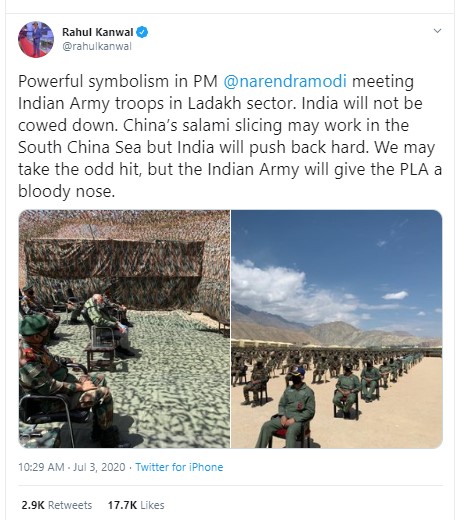
Kanwal then went into paroxysms of joy over Modi’s speech in Ladakh, instantly judging it to be the most passionate address in living memory by an Indian Prime Minister to the armed forces in the context of a grave military crisis. He declared that civilians could not even begin to fathom the electrifying effect this speech would have on the armed forces.

Kanwal was born in 1980. It is unlikely that the ‘80s conflicts in Siachen left any impression on him. The only military crisis he would remember is the Kargil War, when the Prime Minister was Vajpayee. His “living memory” therefore has no substantive value. Besides, Kanwal himself being a civilian hardly qualifies him to evaluate the impact, if any, of the speech on soldiers. Needless to say, neither disqualification prevented him from making grandiose judgements.
Kanwal forged on to claim that Modi warned that any nation pushing ahead with expansionism ends up either defeated or changing course. Very little of Kanwal’s repertoire suggests that he is an international affairs expert, but even he might have noticed that Putin and Xi have pursued expansionist policies since assuming power, and so far have not suffered any personal consequences. The outcomes for their nations are of no relevance – neither country’s leader has any opposition worth its name; nothing short of a national uprising or mortality will displace either of them.
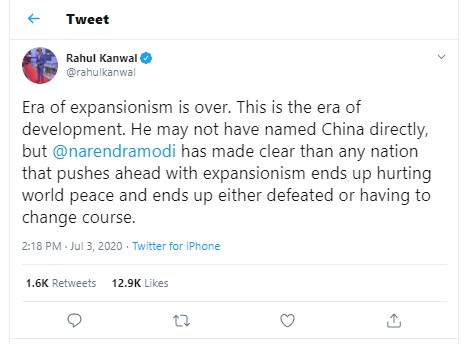
Kanwal reached his nadir when claiming that Modi did not have to do what ordinary mortals would do upon arrival in Ladakh – “go to a hotel, rest, sleep and not walk too much”. By meeting the troops, “Modi not only risked political capital but also personal health”. Kanwal chose not to elaborate on what political capital Modi was risking – to a neutral observer, it is obvious that such a trip only adds to it. Modi reportedly visited Nimu – if this is the same Nimo or Nimmoo referenced prolifically on the Internet, it is at a height of 10300 feet. Presented by a particular news agency as a “forward post”, Nimu is actually a tourist destination, known for river rafting on the Indus or the Zanskar. Hardly at an altitude that one needs to acclimatize to, especially if one flies in directly to spend a few hours.
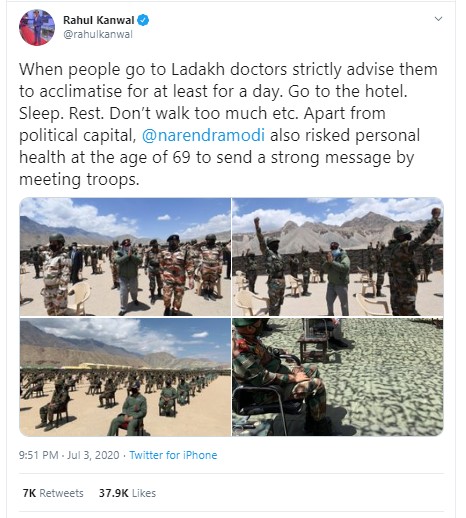
The other “journalist” was Bhupendra Chaubey. Kanwal is affiliated with a news channel but Chaubey is not, at the moment. This did not prevent the latter from making sweeping claims – he adjudged Modi to be the best Prime Minister India has had. In so declaring, a journalist has to be completely blind to what has taken place in the country over the last six years –
- Economic disasters like the absurd levels of fuel tax, demonetization, irresponsible GST implementation and persistent failures in the financial system
- Several key indicators around employment, economic growth and social wellbeing striking lows not seen for decades
- The saffronization of Indian society with Love Jihad, Lynchings, Ghar Wapsi and the like fuelling unprecedented mob violence while history, science and education in general are being perverted
- Being outmanoeuvred internationally with the likes of Trump, Johnson and Xi proclaiming love for India on the one hand while implementing deleterious policies on the other
- Systematic subversion of independent national institutions with numerous instances of merited individuals with minds of their own being replaced by incompetent sycophants
- Undermining our democracy through the frequent toppling of opposition governments and the creation of an opaque electoral bonds framework
- Vilifying anyone critical of the government – the conflation of opposing the people in power with treason and sedition
Far be it from us to attribute any credibility to Chaubey’s judgement of who the best Indian Prime Minister. Even without credentials, Chaubey’s pronouncement seems egregious – he claims that it is the constant and consistent “communication” Modi has with citizens that elevates him above everyone else.
We were unable to determine how old Chaubey is but if he began his career in 1999 as LinkedIn suggests, the only Prime Ministers he covered on his beat are Vajpayee, Manmohan Singh and Modi. We speculate that he was a toddler when Rajiv Gandhi became Prime Minister and so cannot bear personal witness to the charisma that Nehru, Shastri, Indira Gandhi and Rajiv Gandhi wielded, the reactions to their “communications”. Neither do we expect Chaubey to look at all the archival footage to discern the difference between their interactions with common people and Modi’s. He is not a researcher, after all.
These shortcomings must have contributed to his mischaracterization of what Modi engages in as “communication”. By definition, the word implies an exchange of views, a willingness to participate in a conversation. Modi can be accused of a whole host of things, but listening to other people or submitting to questions are not two of them.
When the predictable backlash to his declaration came, Chaubey defended himself demanding that we watch his reportage of Modi over the last decade. Presumably he expects us to find “balanced” coverage in it. This is meaningless, since he knows very well no one would make the effort to find, let alone watch, all the reporting Chaubey has done on Modi.
However Chaubey forgets that he is prolific on social media and search tools make it easy to parse through his tweets to validate his claim. We went through all tweets of his in the past year that had the word “Modi” in them, in particular the ones that used verbs and adjectives to characterize Modi and his actions. We found 32 tweets since 2nd July 2019 that we could assess for the sentiment associated with Chaubey’s characterization of Modi. There were more that alluded to him that had no complimentary or critical connotation. We might have missed some tweets that did not use the word “Modi” but somehow alluded to him. We think it unlikely. To be absolutely clear, we chose only those tweets where Chaubey is not quoting someone else. He is making assertions – statements of his own.
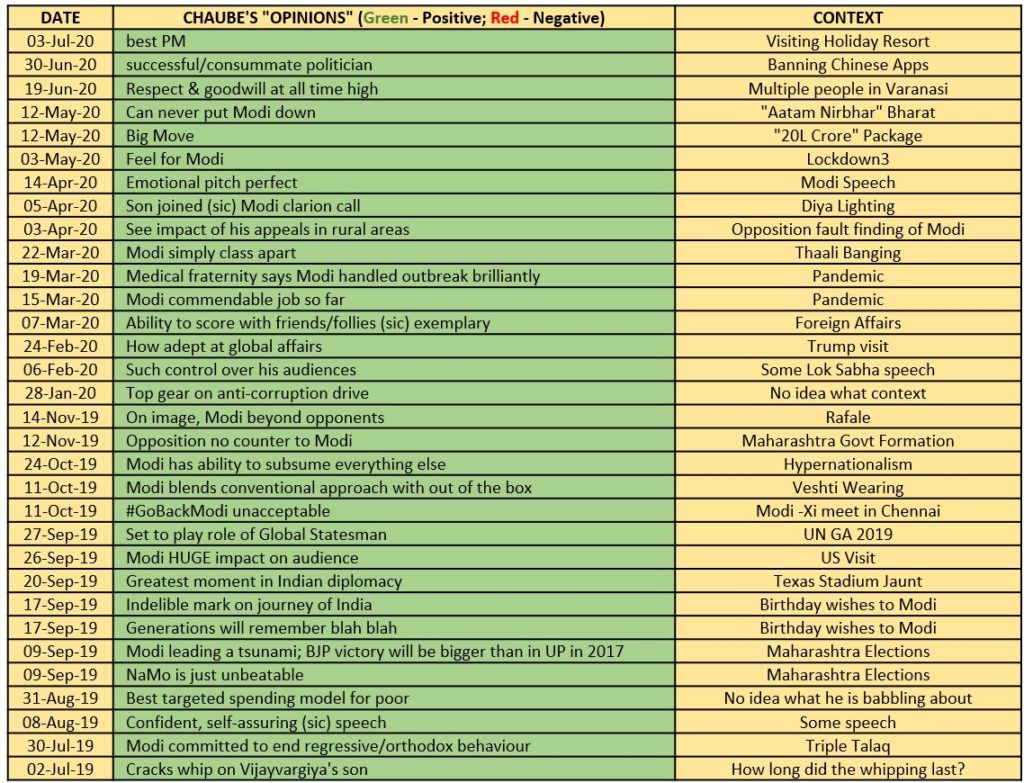
To our utter surprise, all 32 tweets were quite admiring of Modi. This is unusual – here is an ordinary human being who is constantly in the spotlight and a journalist who watches him like a hawk through all of that period. Miraculously, the journalist has been unable to find anything critical to say of that human being. Remember that since last July, a sovereign commitment given by the Union of India to the kingdom of Kashmir has arguably been reneged on, the state broken apart into 3 Union territories, notable Kashmiri politicians designated as threats to national security and incarcerated without trial, a much reviled amendment to the Citizenship Act has been juggernauted through Parliament, the threat of a new Register of Citizens dangled, students and protestors allegedly attacked with many victims ironically facing charges under draconian laws, ordinary citizens massacred in riots in the national capital, Trump has been on a frivolous jaunt through the Indian countryside even as the COVID19 virus was invading Indian throats and lungs, yet another state government toppled through despicably engineered defection, a lockdown imposed without warning, millions walking thousands of kilometres to get home, nearly seven lakh Indians infected and over eighteen thousand have died…
…And the Chinese seized territory controlled by India even as their soldiers caused the deaths of at least twenty of ours. Yet, Chaubey finds not one thing he can criticize Modi for.
In passing, it would be remiss of us not to highlight some statements Chaubey made in the last year. He claims on 19th March 2020 that the medical fraternity says that Modi handled the Pandemic brilliantly. On that day, India had 198 cumulative cases. Just a week before, that other luminous star on the Indian horizon, the Joint Secretary for Health, had asserted that “the coronavirus is not a health emergency.” Something in the subsequent statistics tells us that Chaubey needs to consult his medical fraternity again. Something also tells us that Chaubey will return with the diagnosis that it was the Ministry of Health’s fault, States’ fault, the districts’ fault, the hospitals’ fault, the people’s fault.
Chaubey might have made a career in psephology. On 9th September 2019, he declared that Modi was leading a tsunami in the Maharashtra Assembly elections, and that the BJP would get a victory greater than the one it achieved in Uttar Pradesh in 2017 (won 77% of the seats). NaMo, he marvelled, was simply unbeatable. We leave this without comment.
On 7th March 2020, Chaubey had switched to analysing Modi’s handling of foreign affairs. He has no doubt that it is stunning – Modi’s ability to “score with friends and follies (sic)” is exemplary. Of course, Chaubey had absolutely no knowledge of Trump, just the previous month, soaking up the adulation of a frenzied crowd in India, walked away with a 3 Billion USD defence deal for the US. And we certainly cannot blame him for not knowing that in June 2020, the Chinese would walk into Galwan Valley.
Returning to the subject of Chaubey’s balanced views on Modi, it perhaps was an exceptional year in Chaubey’s view – one in which India got it spectacularly wrong on so many fronts, but Modi was not at fault for any of it. Someone else was to blame for every misstep.
What then of previous years? We went back all the way to July 2017.
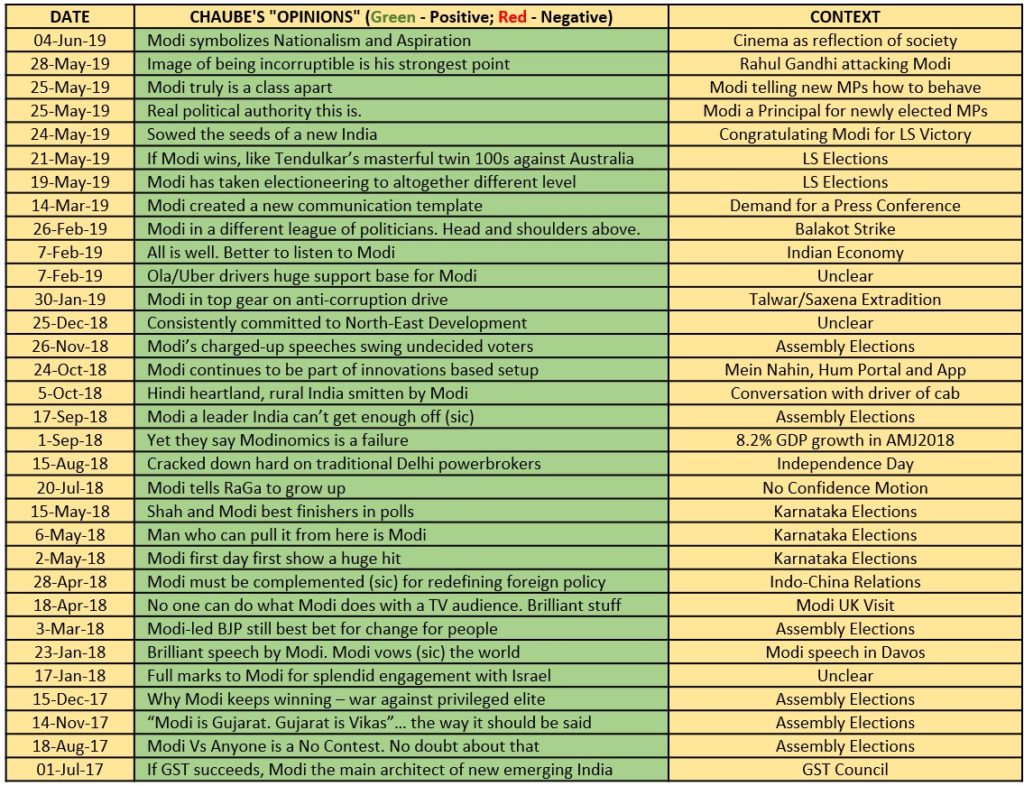
As you might suspect, we found nothing but unstinting praise for Modi. This Narendra Damodar Das Modi clearly is a Yugpurush – a man who descends from heaven once in an era, incapable of making a mistake even if everything around him is a shambles.
To be fair to Bhupendra Chaubey, we did find one tweet in which the words “Modi” and “Villain” appeared together. In the run-up to the Gujarat Assembly elections Chaubey tweeted this in November 2017 –
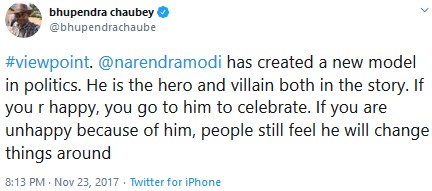
Chaube makes the curious argument that people had two choices before them, both of which were Modi. Modi the hero, who you vote for because he gave you cause to celebrate. And Modi the villain, who you think has done you wrong but vote for nevertheless because he will turn things around. The Executive Editor of a new channel for fifteen years is declaring that it does not matter whether Modi does good or evil – he gets the vote regardless.
Ambrose Bierce, a literary genius, was himself a journalist. When he wrote his seminal work The Devil’s Dictionary, he chose to define Sycophant thus – “One who approaches ‘Greatness’ on his belly so that he may not be commanded to turn and be kicked. He is sometimes an editor.” If he was alive and in India today, he would doubtless have modified the last sentence to read “He is sometimes an editor and often an executive editor.”
Some self-proclaimed journalists need to realize that their audience has long stopped regarding them as journalists. Their deplorable tendency to prostrate themselves to those in power while inciting and titillating the masses daily gets them a large audience, no doubt. However they cannot pander to its demands and simultaneously retain a claim to journalistic integrity.
Santhosh D’Souza(@santhoshd) combines professional interest in technology with a passion for science, history, mythology and current affairs.


